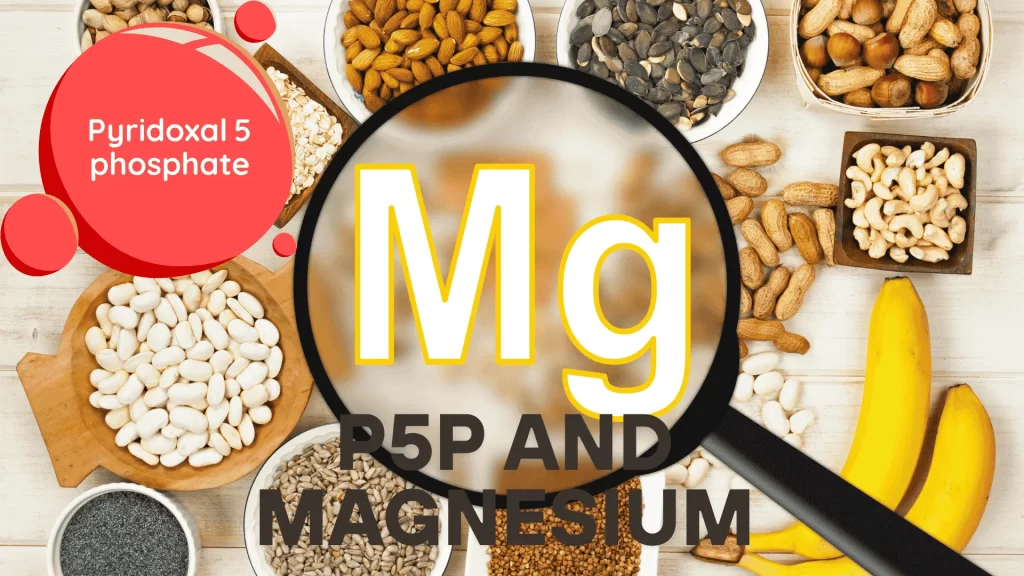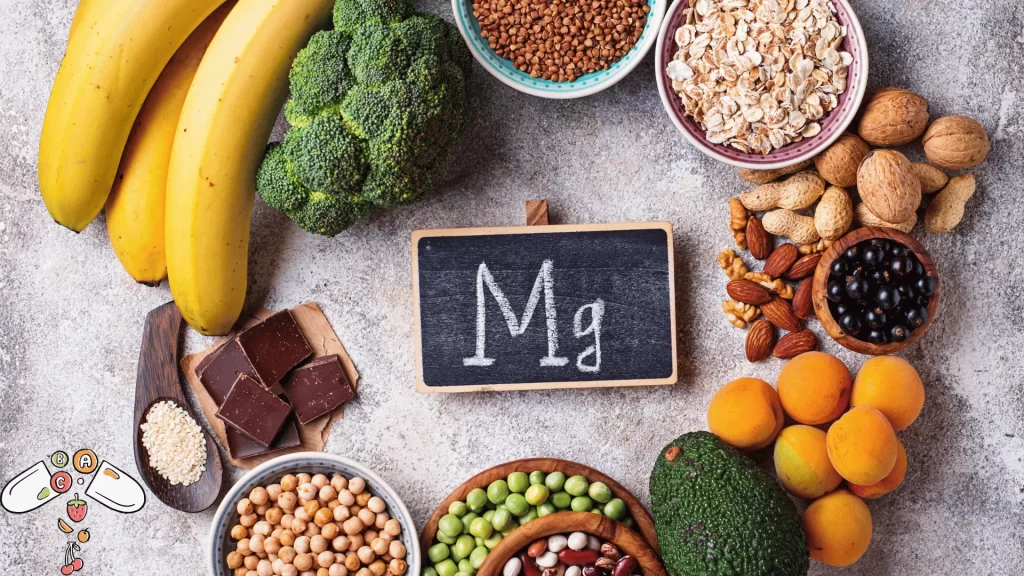Vitamin B5 for Hair: Unlocking Its Benefits for Growth and Strength
Healthy, vibrant hair is a goal for many, and vitamin B5 for hair is gaining attention as a key nutrient to achieve it. Also known as pantothenic acid, vitamin B5 supports hair health through both diet and topical applications, such as pro vitamin B5 for hair (panthenol). This article explores how vitamin B5 for hair growth and vitamin B5 for hair loss can transform your hair care routine, diving into the benefits of pro vitamin B5 for hair and practical ways to use it. With clear science and simple tips, you’ll learn how to harness this nutrient for stronger, shinier hair.
Understanding Vitamin B5 (Pantothenic Acid)
Vitamin B5, or pantothenic acid, is a water-soluble B vitamin essential for overall health. It plays a critical role in producing coenzyme A, which helps convert food into energy and supports cell repair. For hair, vitamin B5 for hair nourishes the scalp and strengthens hair follicles, promoting healthy growth. Its derivative, pro vitamin B5 for hair (panthenol), is widely used in shampoos and conditioners for its moisturizing and strengthening properties.
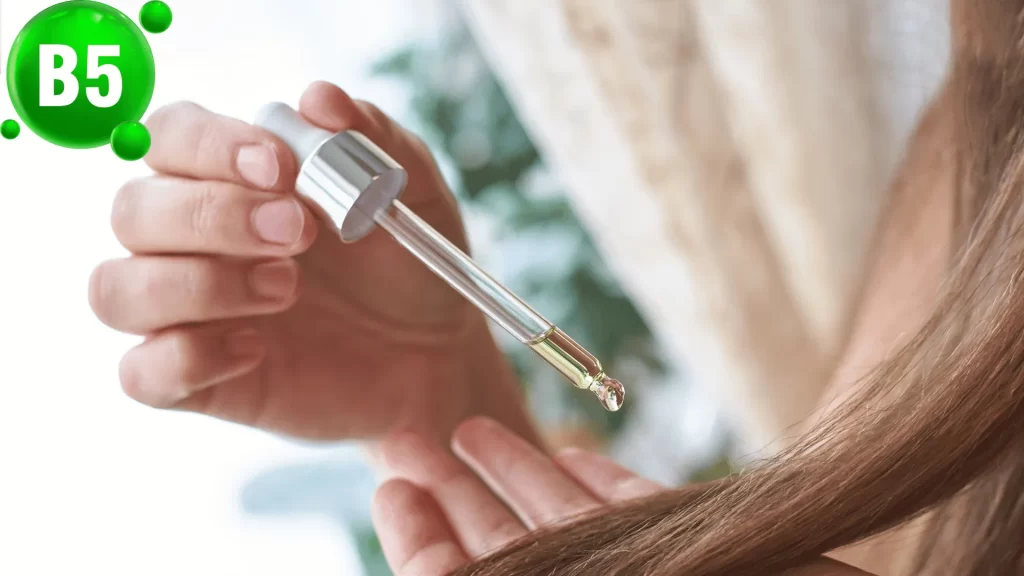
Dietary Sources: You can find vitamin B5 in foods like:
- Avocados
- Eggs
- Whole grains (brown rice, oats)
- Meat (chicken, liver)
- Mushrooms
- Sunflower seeds
Most people get enough B5 from a balanced diet, as deficiency is rare. The recommended daily intake is 5 mg for adults, according to the National Institutes of Health (NIH). However, boosting intake through diet or supplements can enhance vitamin B5 for hair benefits.
Pro Vitamin B5 (Panthenol): When applied topically, panthenol penetrates the hair shaft and scalp, locking in moisture and improving hair resilience. This makes it a staple in hair care products, from shampoos to serums.
Benefits of Vitamin B5 for Hair
The benefits of pro vitamin B5 for hair and dietary B5 are numerous, making it a versatile nutrient for hair health. Here’s how it helps:
1. Moisturizes and Strengthens Hair
Pro vitamin B5 for hair acts as a humectant, drawing moisture into the hair shaft. This reduces dryness, prevents breakage, and enhances elasticity. A 2011 study in the Journal of Cosmetic Science found that panthenol strengthens hair by up to 10%, reducing split ends and improving shine.
2. Supports Scalp Health
A healthy scalp is key to strong hair. Vitamin B5 for hair supports scalp hydration and reduces inflammation, creating an optimal environment for hair follicles. Panthenol soothes irritation, which is especially helpful for those with dry or sensitive scalps.
3. Promotes Hair Growth
Vitamin B5 for hair growth works by supporting keratin production, the protein that forms hair. It also improves blood flow to the scalp, delivering nutrients to follicles. While not a miracle cure, adequate B5 levels can encourage thicker, fuller hair over time.
4. Reduces Hair Loss
For those struggling with thinning, vitamin B5 for hair loss may help. By strengthening follicles and improving scalp health, it can reduce shedding caused by stress, poor diet, or minor deficiencies. A 2017 study suggested that B vitamins, including B5, support hair retention in cases of non-genetic hair loss.
5. Enhances Hair Texture
Pro vitamin B5 for hair coats the hair shaft, smoothing the cuticle for a shinier, softer appearance. Regular use in hair products can make hair feel thicker and more manageable, especially for damaged or chemically treated hair.
How Vitamin B5 Works for Hair
Understanding how vitamin B5 for hair functions can help you maximize its benefits. Here’s a breakdown:
Oral Intake (Supplements and Diet)
When consumed, vitamin B5 for hair supports the body’s internal processes:
- Keratin Production: B5 aids in synthesizing keratin, strengthening hair from within.
- Scalp Circulation: It enhances blood flow, ensuring follicles receive oxygen and nutrients.
- Cell Repair: B5 supports cell turnover, which is vital for healthy hair growth.
Taking a B-complex supplement or focusing on B5-rich foods ensures your body has enough to support vitamin B5 for hair growth. A balanced diet is often sufficient, but supplements can help if your intake is low.
Topical Application (Pro Vitamin B5)
Pro vitamin B5 for hair shines in topical products:
- Penetration: Panthenol penetrates the hair shaft, adding moisture and strength.
- Protective Coating: It forms a protective layer, reducing damage from heat or styling.
- Scalp Benefits: Panthenol hydrates the scalp, reducing flakiness and irritation.
Products like shampoos, conditioners, and leave-in serums with panthenol deliver these benefits of pro vitamin B5 for hair directly to the hair and scalp.
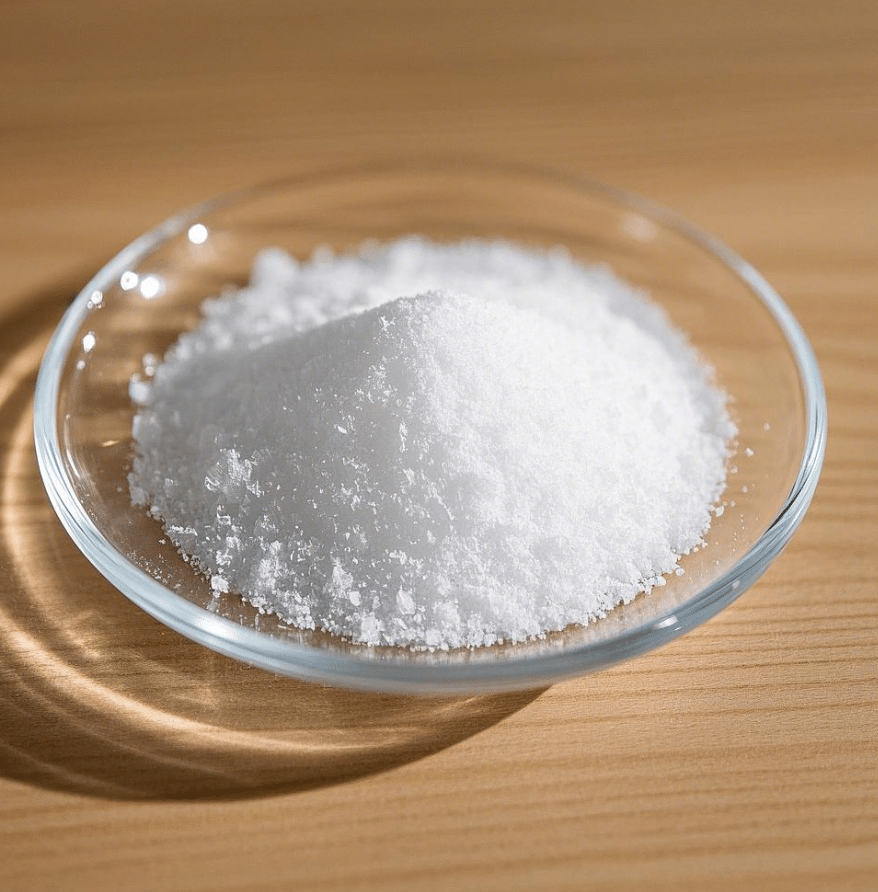
Synergy with Other Nutrients
Vitamin B5 works best alongside other hair-friendly nutrients:
- Biotin (B7): Enhances hair strength and thickness.
- Zinc: Supports follicle health and reduces hair loss.
- Vitamin C: Boosts collagen production for scalp health.
Combining these nutrients in your diet or supplements can amplify vitamin B5 for hair effects.
Practical Applications of Vitamin B5 for Hair
Incorporating vitamin B5 for hair into your routine is easy with these practical tips:
1. Dietary Intake
Aim for the NIH-recommended 5 mg/day of vitamin B5 through foods like avocados, eggs, or whole grains. If your diet lacks variety, consider:
- B-Complex Supplements: These provide all B vitamins, including B5, in balanced doses.
- Standalone B5 Supplements: Useful for targeting higher doses (e.g., 100–500 mg), but consult a doctor first.
2. Topical Products with Pro Vitamin B5
Look for hair care products listing “panthenol” in the ingredients. Effective options include:
- Shampoos and Conditioners: Use 2–3 times weekly to hydrate and strengthen hair.
- Leave-In Treatments: Serums or sprays with panthenol add extra moisture and protection.
- Masks: Deep-conditioning masks with pro vitamin B5 for hair repair damaged hair.
Tip: Choose products with at least 1–5% panthenol for noticeable benefits of pro vitamin B5 for hair. Check for third-party certifications (e.g., dermatologist-tested) for quality.
3. Combining Oral and Topical Use
For maximum vitamin B5 for hair growth benefits, combine diet/supplements with topical products. For example:
- Eat B5-rich foods daily.
- Use a panthenol-based shampoo and conditioner.
- Take a B-complex supplement if advised by a healthcare provider.
4. Best Practices
- Consistency: Use topical products regularly for 6–8 weeks to see results.
- Patch Test: Test new panthenol products on your skin to avoid rare allergic reactions.
- Holistic Care: Pair vitamin B5 for hair with proper hair care (e.g., minimal heat styling, regular trims).
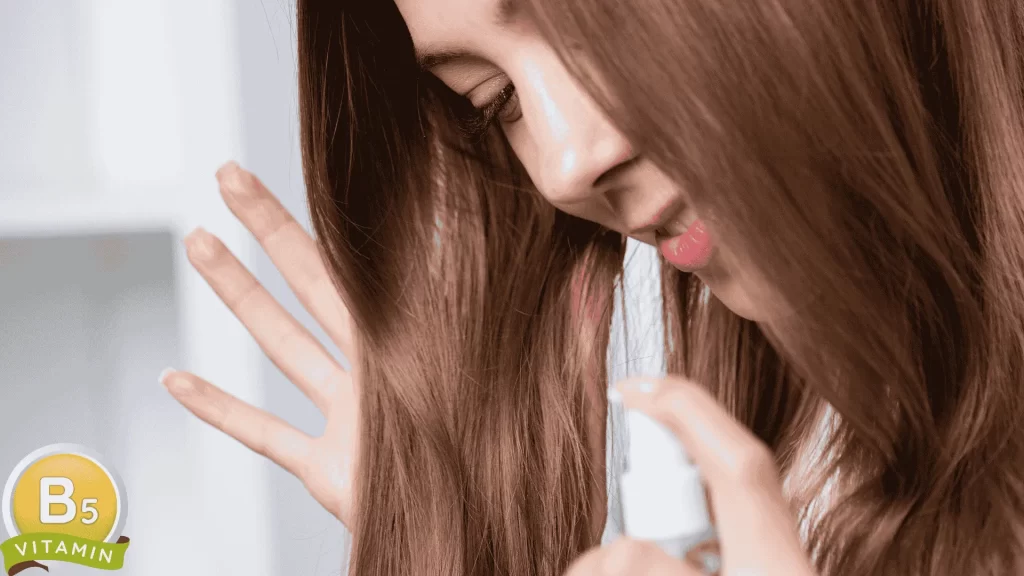
Addressing Hair Loss with Vitamin B5
Vitamin B5 for hair loss can be effective in specific cases:
- Strengthening Follicles: B5 supports follicle health, reducing breakage and shedding.
- Stress-Related Hair Loss: B5 helps the body manage stress, which can contribute to hair thinning.
- Deficiency-Related Loss: Low B5 levels may weaken hair; correcting this can improve retention.
However, vitamin B5 for hair loss is not a cure for genetic conditions like androgenetic alopecia. For persistent hair loss, consult a dermatologist to check for underlying causes, such as:
- Hormonal imbalances (e.g., thyroid issues)
- Nutrient deficiencies (e.g., iron, B12)
- Scalp conditions (e.g., dermatitis)
A 2019 study in Dermatology and Therapy found that B vitamins, including B5, improved hair density in women with diffuse hair loss when combined with other nutrients like zinc.
Potential Side Effects and Precautions
Vitamin B5 for hair is generally safe, but consider these precautions:
Oral Vitamin B5
- Side Effects: Rare, but high doses (>10 g/day) may cause mild diarrhea or stomach upset.
- Precautions: Stick to the recommended 5 mg/day unless advised otherwise. Consult a doctor if you have kidney issues or take medications like antibiotics.
Pro Vitamin B5 (Topical)
- Side Effects: Panthenol is well-tolerated, with minimal risk of irritation. Rarely, sensitive skin may react.
- Precautions: Perform a patch test before using new products. Avoid overuse, as excessive product buildup can weigh hair down.
For ongoing hair loss or scalp issues, see a healthcare provider to rule out serious conditions.
Conclusion
Vitamin B5 for hair is a game-changer for achieving stronger, shinier, and healthier hair. Whether through diet, supplements, or pro vitamin B5 for hair in topical products, this nutrient delivers impressive benefits. From promoting vitamin B5 for hair growth to combating vitamin B5 for hair loss, it supports both scalp and hair health. Start by incorporating B5-rich foods like avocados and eggs, and choose quality hair products with panthenol. For personalized advice, consult a healthcare provider or dermatologist to optimize your vitamin B5 for hair routine. With consistent use, you’ll unlock the full benefits of pro vitamin B5 for hair and enjoy vibrant, resilient locks.
Does vitamin B5 help hair growth?
Yes, vitamin B5 for hair supports hair growth by aiding keratin production, a key hair protein, and improving scalp blood flow to nourish follicles. While not a cure for hair loss, studies suggest it promotes stronger, healthier hair. Combine with a balanced diet for best results.
What not to mix with vitamin B5?
Vitamin B5 for hair is safe with most supplements. However, high doses of B5 may interfere with biotin (B7) absorption, though this is rare. Avoid taking with certain antibiotics (e.g., tetracyclines), as they may reduce B5 effectiveness. Consult a doctor if on medications.
Does vitamin B5 stop grey hair?
There’s no solid evidence that vitamin B5 for hair prevents or reverses grey hair. Grey hair is mainly genetic or age-related, linked to melanin loss. Some anecdotal claims suggest B5 may delay greying by supporting scalp health, but studies are lacking. Focus on overall hair care instead.
Is biotin the same as vitamin B5?
No, biotin (vitamin B7) and vitamin B5 for hair (pantothenic acid) are distinct B vitamins. Both support hair health—biotin strengthens hair, while B5 moisturizes and aids growth. They often work together in B-complex supplements, but their functions differ. Choose based on your specific needs.
References
- National Institutes of Health. (2023). Pantothenic Acid: Fact Sheet for Health Professionals. https://ods.od.nih.gov/factsheets/PantothenicAcid-HealthProfessional/
- Zempleni, J., et al. (2011). “Panthenol in hair care: Effects on hair strength and moisture.” Journal of Cosmetic Science, 62(2), 199–210.
- Trüeb, R. M. (2019). “Serum biotin levels in women complaining of hair loss.” Dermatology and Therapy, 9(1), 73–81. doi:10.1007/s13555-019-0278-6
- Kennedy, D. O. (2016). “B Vitamins and the Brain: Mechanisms, Dose and Efficacy—A Review.” Nutrients, 8(2), 68. doi:10.3390/nu8020068

